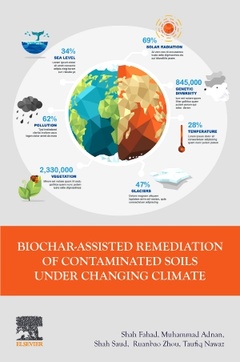Description
Biochar-assisted Remediation of Contaminated Soils Under Changing Climate
Coordinators: Fahad Shah, Adnan Muhammad, Zhou Ruanbao, Nawaz Taufiq, Saud Shah
Language: English
Subject for Biochar-assisted Remediation of Contaminated Soils Under...:
Keywords
<; p>; Biochar; climate change; heavy metals; contaminated soil; soil conditioner<; /p>
400 p. · 15x22.8 cm · Paperback
Description
/li>Contents
/li>Biography
/li>Comment
/li>
Biochar-assisted Remediation of Contaminated Soils Under Changing Climate summarizes recent progress in understanding (a) metal-biochar interactions in soils, (b) potential risks associated with biochar amendment, and (c) the application of biochar for the remediation of HM polluted soils. In addition, research gaps and future directions in understanding biochar-metal interactions in soils is also explored. As soil contamination with heavy metals like Cr, Co, Cu, Ni, Mn, Cd, Pb, and Zn is becoming a big problem across the globe, especially in developed countries, this book elucidates on risks and future directions. Globally, it has become a serious threat to human health and ecosystem integrity. applying amendments like phosphate compounds, liming materials, clay minerals, coal fly ash, organic composts, metal oxides, and biochar to heavy metals contaminated soil is considered one of the most promising in-situ remediation techniques. Biochar has become one of the most attractive research hotspots as a result of its special properties, along with its important role in climate change, global biogeochemical cycle, and environmental system.
2. Biochar Vs soil health under changing climate
3. Heavy metal polluted arable land and its consequences: a global scenario
4. Biochar and micronutrients availability: problem and prospects
5. Biochar induced immobilization of heavy metals: Mechanism and implications
6. Biochar facilitated soil microbial diversity under contaminated soil
7. Biochar vs heavy metals under changing climatic conditions
8. Biochar assisted growth regulation in plants under contaminated soils
9. Biochar induced soil fertility under polluted soils
10. An investigation into the reactions of biochar in heavy metal polluted soils
11. Characterization and evaluation of different biochars for their application as a soil amendment under polluted environment
12. Biochar for carbon sequestration under heavy metal contaminated soils
13. Benefits and limitations of biochar application under polluted soils
14. Environmental benefits of biochar under changing climate
15. Biochar: a new technology for restoring contaminated and degraded soils
Dr. Adnan Works as lecturer at the Dept. of Agriculture, Univ. of Swabi. His research area is soil microbiology & plant nutrition. including FUE, sustainable nutrients (NP) management via organic manures and bio-fertilizers like rhizobia and PSB, N2 fixation by legumes for increasing cereal production, organic wastes management via composting and soil carbon sequestration for sustainable agricultural production and reduced greenhouse gasses (CO2, & N2O) emission.
Khyber Pakhtunkhwa Agricultural University, Peshawar.
Research areas include biochar optimization to improve crop productivity and the impact of climate change and soil contamination on grain production.
Dr. Shah Saud received his Ph.D. in Horticulture from Northeast Agricultural University, Harbin, China. He is currently working as a postdoctoral researcher in the Department of Horticulture, Northeast Agricultural University. Dr. Saud has published more than 125 research publications in peer-reviewed journals. He has edited three books and wri
- Enables readers to understand the most recent developments surrounding metal-biochar interactions in soils and their impact on agricultural productivity
- Provides the latest statistics and literature review regarding the role of biochar in remediation of heavy metals polluted soils
- Examines the global status of heavy metals polluted soil
These books may interest you

Heavy Metals Release in Soils 56.31 €



